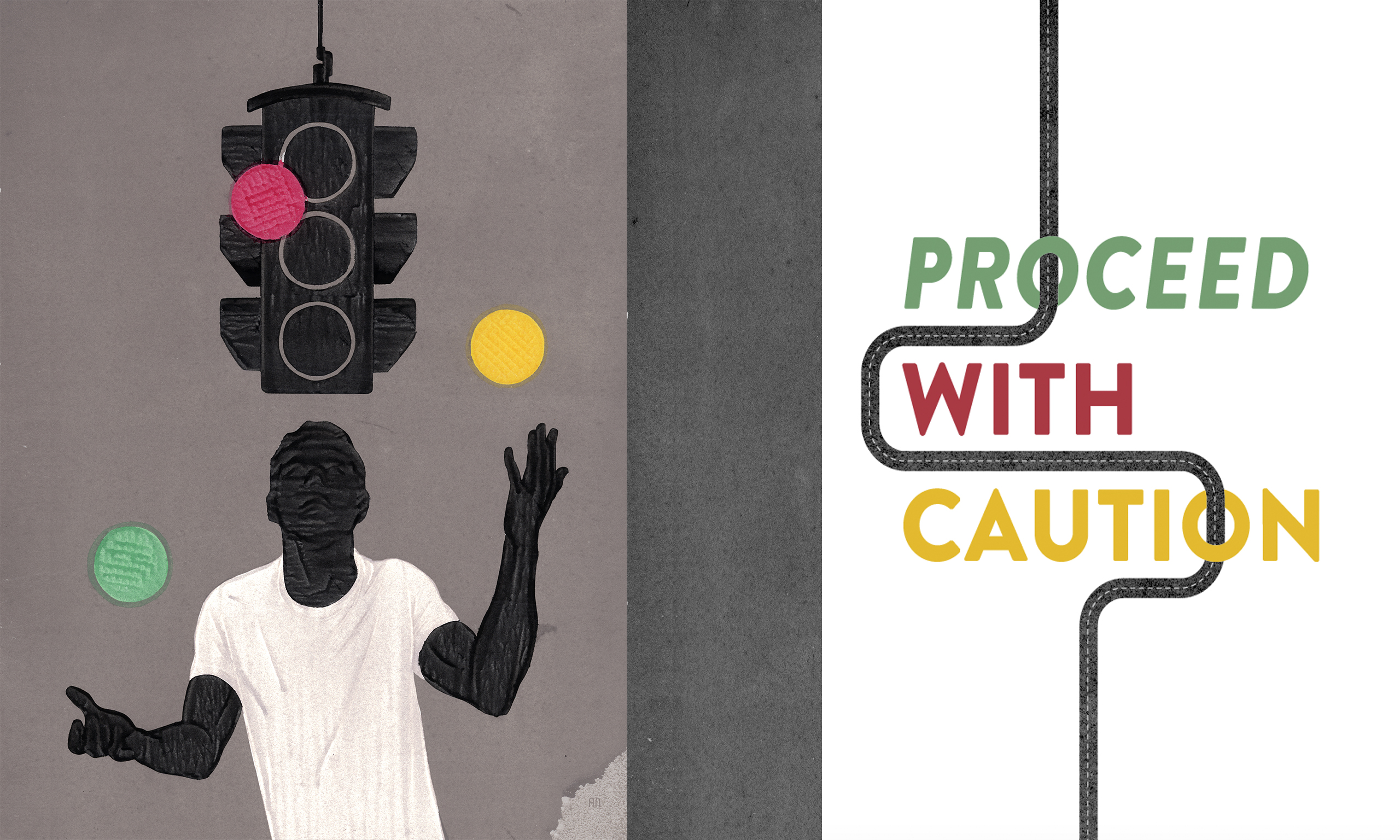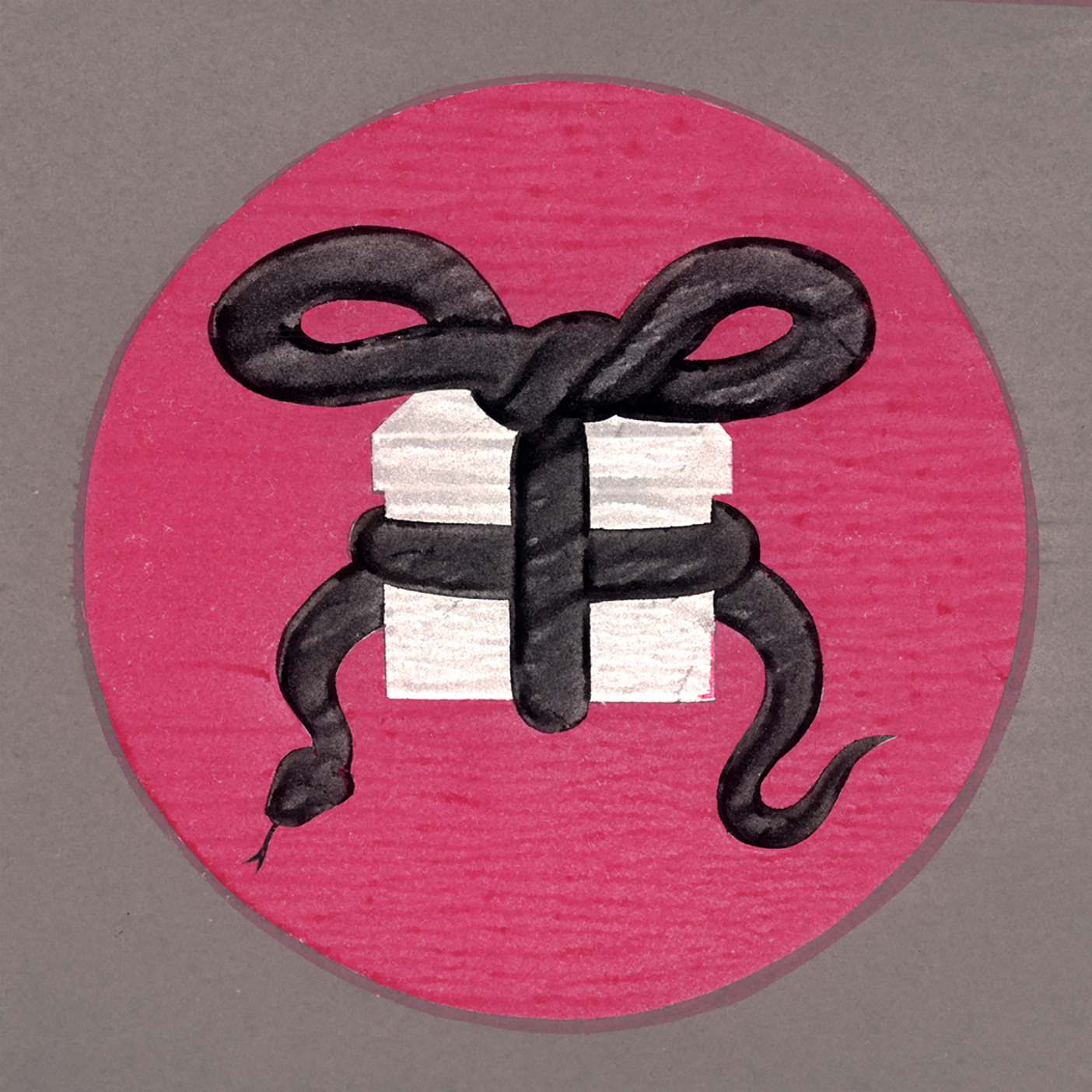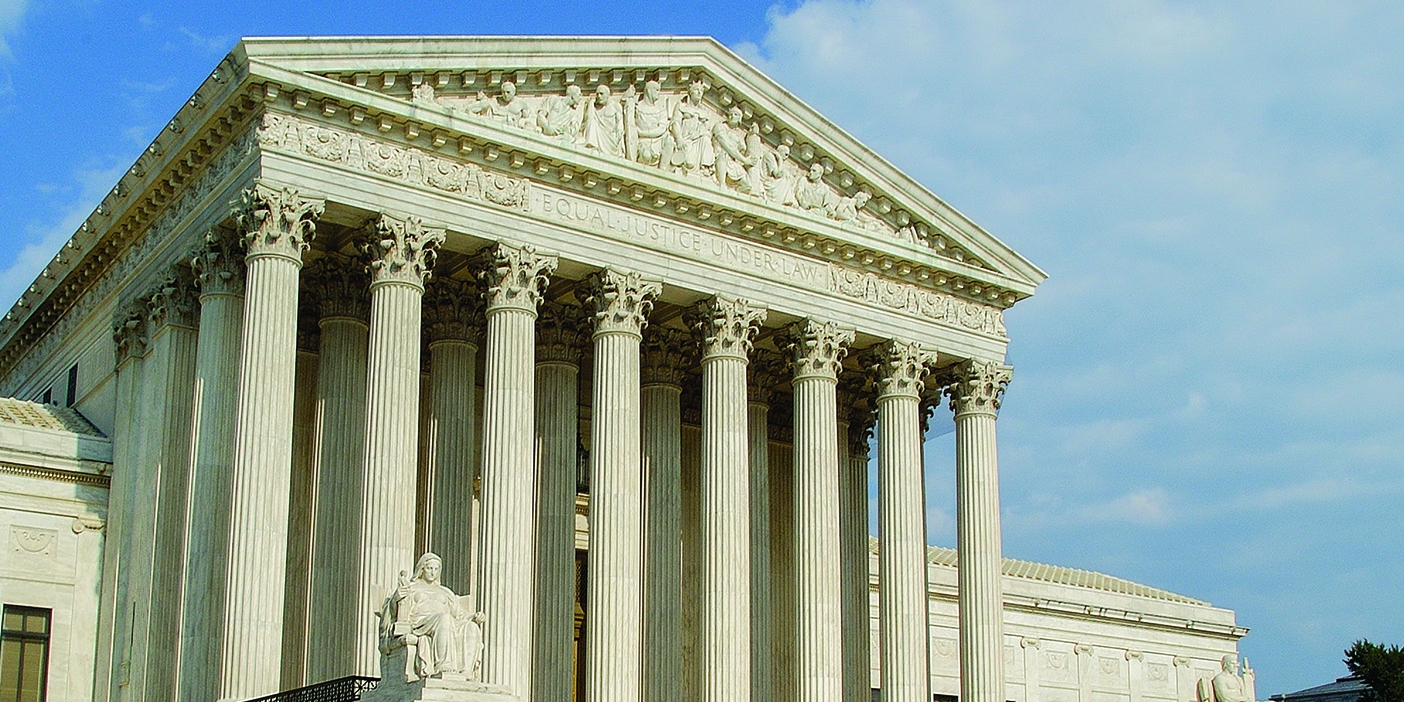Proceed With Caution

Stop? Go? Turn? How would you navigate these five ethical dilemmas?
By Brittany Karford Rogers (BA ’07) in the Spring 2014 Issue
Illustrations by Alex Nabaum
IT WAS LIKE MANNA FROM HEAVEN, ONLY STEER.
A giant box of Omaha steaks, $250 worth, arrived at the door. And Bradley R. Agle (BS ’86) was no vegetarian.
But the sender stumped him: “Dow Jones?” Agle wondered. Eventually, it clicked: Dow Jones owns the Wall Street Journal. Agle had just purchased subscriptions of the paper for the University of Pittsburgh’s entire business school. The company was saying thanks in filet mignons and New York strips.
Agle, now the George W. Romney Endowed Professor at BYU, retells the beefy predicament like an old war story. “So,” he continues—and here come what seem to be his favorite four words—“what do you do?’
Don’t see the predicament? You’re not alone. Agle’s Pitt colleague received the same meaty thank-you—and threw a barbecue. But for Agle, the carnivore’s dream package had “conflict of interest” written all over it.
Worth $250, the steaks were no trivial gift, he says. Someone not in the know might suspect he finagled the deal to get the personal kickback. And accepting such a gift might color how he spent university money in the future.
“People just struggle with conflict of interest,” says Agle. “They just don’t get it.” But he’d argue it’s the most common kind of ethical dilemma there is.
It’s an ethical minefield out there, and Agle and business management professor Aaron M. Miller (BA ’02, MPA ’06, JD ’06) have set out to flag the mines. For the last three years, the pair has surveyed incoming BYU MBA and executive MBA students, asking them to dish on the dilemmas they faced in previous roles as physicians, principals, police officers, and everything in between. From those hundreds of responses, Agle and Miller codified and categorized. When they were finished, they had 13 categories under which every dilemma fit.
“Good ethicists say, ‘Our job is to help you ask good questions.’” —Brad Agle
Now, along with contributing author Bill O’Rourke, former president of Alcoa Russia, they’re creating a first-of-its-kind field guide that not only identifies these categories but shares what kinds crop up most frequently—and how to navigate them. Chances are you’ve battled in at least one of the 13 categories. And chances are you could have done better.
Now it’s time to test your probity.
Laid out in this article are five common ethical dilemmas, each with a real-life example and a chance for you to answer Agle’s question: “What do you do?”
Beware: there’s not always one absolute, right answer. But there’s help. With each dilemma they set forth, the experts share questions they’ve tailored for that specific category of moral quagmire. “Good ethicists say, ‘Our job is to help you ask good questions,’” says Agle. Deliberate through their dilemma-specific questions, he says, and you’ll begin to see the contrast between wrong, getting-there, and pat-yourself-on-the-back answers.
One more caution: Watch out for the Latter-day Saint blind spot. The researchers say their students often assume that as intelligent, upstanding Church members, they have ethics down pat. “It takes the first few weeks of every semester to break our students down, to make them see that ethics is incredibly messy and hard, that some of the most skilled, thoughtful, moral people in the world struggle,” says Miller.
So what happened to Agle’s steaks?
“Steaks went to the food bank.”

WEDDING PAYOFF?
You’re a vice president at a company that makes medical devices, and your medical director just got back from his honeymoon. You’re visiting about the wedding—the cake, the dancing, the attendees—and he mentions that two epidemiologists, whom he hired to do contract work for your company, were at the affair. They are his buddies from med school and—would you believe it?—they each gave him $2,000 as wedding gifts. “Isn’t that nice of them?” he says.
What do you do?
Whenever someone wears multiple hats, Conflict of Interest dilemmas are lurking. A conflict of interest arises when someone’s personal interests influence—or may appear to influence—his or her official duties. And conflicts of interest extend well beyond when you can accept gifts. Under what circumstances should a manager hire a family member? Is there harm in a bishop displaying political signs in his yard? When you coach your kid’s soccer team, who gets to play most?
Questions to Ask
Are there any clear rules (organizational or otherwise) you should be following?
• How important is the social expectation that creates the conflict?
• Would your actions cause others to question your motives?
• Who has a right to know the details, and have you let them know?
• Is there a way to remove yourself to avoid the conflict of loyalties, or could one of the involved parties free you from your obligation to them?
• What should you do now to avoid conflicts in the future?
Discussion
Agle says the answer to a conflict of interest dilemma isn’t simply whether you can come up with an ethical justification for what you are doing. “Because in most cases, you can,” he says. The question should be, is your behavior above potential reproach? “Most people who would judge your choice are going to do it without knowing everything,” says Agle, and if your behavior doesn’t hold up, you bear a potential cost: “You’re going to be seen as untrustworthy or as someone who can be bought.”
Agle says disclosing the situation can help—to a point. Recent research shows that disclosing conflicts of interest sometimes creates a false sense of security. “You think, “I’ve told everyone, they’ve been warned,’” thinking that if others are aware that something is going on, it must be above board. The bottom line, says Agle: “We are not objective. We believe we are, but we are all biased.’
When it comes to conflicts of interest involving gifts, O’Rourke advises applying discretion when the gift is of nominal value. And when it isn’t? O’Rourke has declined Super Bowl tickets, golf trips in Hawaii, and more—and shares his approach: “I say, ‘We don’t do business that way. . . . Oh, and by the way, if you can make an offer like that then you can refine the bid and make the price even better.’”
What Would the Ethicists Do?
O’Rourke, the actual vice president in this story, made the medical director give the money back. Miller suggests an alternate route: give the money to a charity supported by the company, and notify the friends of this action. The situation could have been avoided, says O’Rourke. “He could have sent out his invitations and said, ‘I hope you can come to my wedding because we’re good friends, but given our business relationship, a gift would be inappropriate.’”

BOSS’S ORDERS
You’re a division manager at a company that makes bicycles, and you just got the bad news: the boss is axing your line of bikes. “But don’t tell anybody,” he warns; if consumers find out, the bike will have to be sold at a steeper discount, since people don’t like to buy discontinued products.
Your supplier in Brazil doesn’t know the line will be discontinued either; they’re still churning out bike parts. If you don’t tell them to stop, they’ll continue manufacturing—and every part they build tomorrow will be worthless. You relay this to your boss. “Do we have a contract with them?” he asks. They already filled your most recent contract, and you haven’t made a new one. “Then don’t tell them anything,” says the boss. “Act as if nothing has changed.”
What do you do?
Miller and Agle categorize this as an Unethical Request from an Authority Figure. In this type of dilemma, someone is exerting hierarchy to get you to flout rules or violate standards of decency. It happens all over the workplace, says Miller, frequently in the form of a boss asking you to fudge a report. There are examples outside of the business world too; on the trivial end of the spectrum, would you instruct your kids to tell someone on the phone that you’re not home? On the much graver end is the famous Milgram experiment from the ’60s. Nearly two-thirds of the study’s participants were willing to administer severe electric shocks to an unseen stranger, even when they could hear the stranger scream out in pain and complain of a heart condition—simply because the experiement authority told them to do so.
Questions to Ask
• Does the authority figure have the right (legal, contractual, moral) to ask you to do what he or she is asking?
• Are there others around or above you who agree with you?
• Is the request in accordance with the stated values or ethics policies of the organization?
• Are there ethics resources, like a hotline or ombudsman?
• What is the authority figure attempting to accomplish? Is there a different way of accomplishing it?
• How can you help this person save face and also do the right thing?
Discussion
This type of ethical dilemma can be particularly scary, says Miller, because going against your boss involves great personal risk. He acknowledges that many of the questions he and Agle have provided above are organizationally bound—like checking for a company ethics hotline. If such resources aren’t available, find other sources of support; you’ll feel safer when standing up to the person in charge, he says.
“What you don’t want to do in this type of dilemma is give in immediately,” says Miller. If you have to make a hasty decision, you’re more likely to comply. “If you can buy yourself time, you can create a circumstance in which you can make a much better choice.”
O’Rourke has had to cross a superior more than once—like when a cancer-causing carcinogen was found near an Alcoa plant, but it couldn’t be traced to the plant. Told to do nothing, “I asked the question, ‘What would the best company in the world do?’” says O’Rourke. “That’s a different answer, isn’t it? That really raises the bar.” Alcoa responded by knocking on every door in the community, delivering bottled water, installing filters. “Is there honor in business?” asks O’Rourke. “I think so.”
What Would the Ethicists Do?
Miller would point out to the boss the potential repercussions in keeping mum: the supplier could sue, and other suppliers might distrust a manufacturer that hangs a supplier out to dry. “Both increase the cost of doing business,” says Miller.
Agle would also seek to inform the supplier—but more aggressively. “In some cases, like this one, a person needs to change the power dynamic. I would go over my boss’s head to see if I could get support.”
No matter what, says O’Rourke, the supplier must be apprised, even if it means you lose your job. “Losing the job is better than losing your integrity,”he says.
IT’S JUST BUSINESS?
Out of work and with a family to support, you hire a headhunting firm to help spread your résumé. A great offer comes along from a liquor company in Europe; they’re looking for someone to do the accounting for their exports to the United States. As a Latter-day Saint, you’re anguishing because the company profits from an industry that is in conflict with your beliefs. They say, “We don’t want you to drink the stuff; we just want you to count it.” It’s a great employment opportunity otherwise.
What do you do?
Inevitably, situations arise that challenge lines we’ve drawn in the sand. Agle and Miller categorize these dilemmas under the label of Sacrifice of Personal Values. These dilemmas involve values you hold but you can’t expect others to hold. For example, Latter-day Saints can’t expect the world at large to halt business on Sunday. But can they expect to be exempt from Sabbath-day work? For examples outside the business world, think of this: If I have a strong commitment to human rights, do I still buy clothing or electronics manufactured under conditions in which I would never work so that I can afford to buy these items? Do I buy the album of musicians whose lifestyles I couldn’t endorse, and in so doing help support them?
Questions to Ask
• Would an outside observer consider you true to your beliefs?
• Would your involvement substantially promote the behavior that conflicts with your beliefs?
• How much does social consensus support your beliefs?
• What costs are you willing to bear for your beliefs?
• What burden would be placed on others by your living your personal values?
• Were you aware of this conflict sufficient to have avoided it?
Discussion
“BYU alums sometimes have a reputation—and we know this from talking to employers—of charging the hill when they encounter an ethical problem,” says Miller. “They sort of take their banner in hand and attack. But in battle, those are always the people who get killed first.” It’s not that you shouldn’t work to achieve the right outcome, he says. “We just want you to be more strategic and smart about it.” The professors want students to prepare with ideas on how to graciously navigate a cocktail party, how to interact with colleagues who practice alternative lifestyles, and how to respond when a job asks them to work for an industry they don’t believe in.
On the flip side, O’Rourke, says many companies don’t hire BYU students expecting them to be like everybody else. “A lot of people write down values and visions, and they don’t live it. You are going to be expected to have a higher degree of ethical conduct,” O’Rourke tells BYU students. “In fact, you’re going to be hired because of that. Take it as a challenge, and live up to it, and make your workgroup better. That goes with the territory here.”
What Would the Ethicists Do?
“My grandfather faced this very situation,” says Miller, “and I love his response: ‘Each night I want to be able to pray for the success of my employer. I couldn’t do that in this job.’” Agle echoes that statement, adding, “I might accept the job for a while if things were desperate, but ideally, I want to . . . be excited to come to work each day.”

YOU ACCEPTED, EXCEPT…
As a BYU senior you interview for a job you’d love in your North Carolina hometown. The interview goes well, but unfortunately, they hire someone else—and they don’t foresee other positions opening in the near future. With that door closed, you accept a great job in Kansas City. The company even flies you out to meet your new colleagues. But right before graduation, the North Carolina company reverses course and offers you the job you originally wanted, and it pays $10,000 more than the one you accepted in Kansas City.
What do you do?
Agle and Miller couch this kind of dilemma under the category You Made a Promise, and the World Changes. We commit to do something, giving others the legitimate belief that they can rely on us—but then something comes up. Recessions hit, accidents happen, better offers come along. Sometimes we make two competing promises: say, to be home for dinner and to finish a project at work. Sometimes we make promises when conditions are favorable—but we’re tempted to walk away from a house payment when the market tanks. And sometimes we make broad, undefined promises; going into them, we don’t know all that they will entail. The promise you make to your spouse and to Heavenly Father, says Agle, “is the most vague promise you will ever make. In the vernacular of the world, it’s ‘I do.’”
Questions to Ask
• Can you still keep your promise, even if it is costly to you?
• Did you predict or could you have predicted the change?
• Does the other party still expect you to keep your promise?
• Is there an alternative that would make the promised party as happy as if the original promise were kept?
• Did the change make it harder to keep other promises you’ve made, or did it make another promise you’ve made more relevant?
• If you break the promise, will you bear the consequences?
Discussion
When you make a promise, says Agle, you take on the moral duty to make all reasonable efforts to fulfill that commitment. So here’s his first point of advice: try to anticipate how future events might affect your commitment and avoid making unwise and unclear promises to begin with.
Still, sometimes the world changes in ways you could never predict. And sometimes the ethical thing to do is to break a promise. Agle has had plenty of experience with this at home; he’s even had to—gasp—cancel Disney World. “We want our kids to learn to make and keep promises, yet we sometimes break promises to our kids,” says Agle. “So one of the things we need to be able to teach our kids is there are circumstances under which it’s actually OK to break a promise.” Even so, say the researchers, accountability is key. Seemingly trivial broken promises are opportunities for parents to model ethical accountability. Whether it’s with your kids or with a partner in business, says Agle, acknowledge and apologize, and don’t underestimate the power of identifying and offering an alternative that would make the other party just as happy.
That said, says Agle, “my bar is pretty high on how much the world has to change for me to break a promise.” Legally, you can renege on a job you accepted without penalty, but keeping your word matters not just for your personal reputation, but also for the reputation of entities you represent—in this case, BYU. Some employers say they are wary of hiring BYU students. The reason? The researchers share an employer response to a BYU Career Services survey: “They always want to go back and live by family, usually in Utah. The graduates should know it’s time to leave the nest and make their way in the world.”
What Would the Ethicists Do?
All three ethicists agree that the crux of the correct choice here depends on what the employment expectation is in Kansas City. “Disclose the information openly, honestly, and quickly,” telling them your clear preference, says O’Rourke. Then find out if a year or two would fulfill the expected commitment, or if it would just be worse to come for a short time and then leave. If the latter, ask permission to rescind, but be willing to keep your commitment. Agle says he’d take the Kansas City job and tell the hometown employer, “I already made a commitment, but I would love to stay in touch.” It communicates that you’re a person who follows through on your word, he says.
TURNING A BLIND EYE
You are the head of internal audit for a large company. Your company recently passed an external audit, but you discover that one of the company’s units didn’t segregate certain accounting duties as required by federal law for compliance. When you ask the unit manager why, he says that he was following specific instructions from the CEO. It is technically not required of you to report this incident, since the company passed the external audit, and you know that doing so would upset the CEO—it would certainly put him in the hot seat—not to mention you could be fired.
What do you do?
Any time you experience risk by trying to make something right, or stop something from happening, you’re in an Intervention dilemma. “They kind of just fall into your lap,” says Agle. “You’re not the one who brought it about, . . . but now you see it happening.” Intervention dilemmas abound outside the business sphere—do you intervene when you hear someone make a racist joke? When someone is cheating? When someone is being bullied? When you see someone break a law?
Questions to Ask
• Are you the right person to intervene, or should you recruit help?
• Does the urgency and potential impact require you to act now?
• Would your intervening require you to act unethically?
• Would your intervention create a permanent solution or a temporary fix?
• Are your motives to intervene pure?
• Is the problem the result of one person’s behavior or a systematic failure?
• Would your intervention require one act of intervention or sustained, regular effort?
• Can you intervene in a way that creates the least harm to everyone involved?
Discussion
In this type of dilemma or any other, says Miller, accept that your involvement comes with a price. “Sometimes bad stuff happens, and you’ve got to deal with it, and it’s expensive to you, and it might require a sacrifice that only benefits others. In fact, you could be worse off forever because of it. But it doesn’t change the right thing to do.”
Cases like this one can be particularly challenging for a younger professional, says Miller, “someone who may not have the power or the social capital to step in and say, ‘This is wrong.’” The same goes for a child trying to stand up to a bully; will he or she have the power to stop the situation, or will someone with authority be needed?
Yet when we intervene, whether it’s standing up to a CEO or acting on behalf of a child, there’s something we all too often overlook: forbearance for the perpetrator. “So often when our sense of justice is violated, we immediately think of those being hurt. We want to enact justice,” says Miller. “We become zealous about it. But the person causing the need for intervention deserves attention as well. . . . Ask yourself, ‘How should I think about that person?’”
What Would the Ethicists Do?
Even though the unit passed the external audit, O’Rourke says the ethical choice would be to disclose the unit’s noncompliance—even at the risk of being fired for outing the CEO like that. But he would give the CEO a heads-up—strategically—say, alerting the CEO on a Friday evening that you’re going to spill the info. “Give him the weekend to think about it, right?” says O’Rourke, enabling him to avoid a knee-jerk mistake, to regain a cool head.
Agle, too, would talk to the CEO—inviting the CEO to share how he would like the information relayed. “However,” says Agle, if he doesn’t do it himself, “I would be firm in telling the CEO that I will relay the information.”




